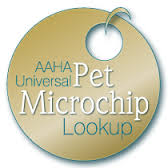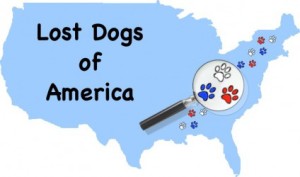Microchips are small and mighty.
Short of a visible tag with your contact info that that instantly assist a “finder” to let you know they found your pet, the microchip could be the best chance you have of being reunited should your pet go missing!
But, when it comes to knowing the 411 about microchips you can say that the story is “complicated”.
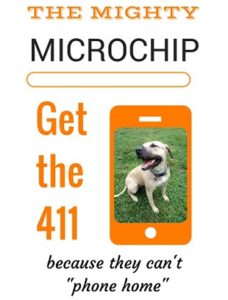
All chips are NOT created equal!
It is NOT a GPS tracking device, and they are only as good as the info registered and the thoroughness of a pet being scanned.
A microchip is about the size of a grain of rice. It is injected into your pet’s shoulder area, but does not create any real pain. When scanned, it connects with REGISTERED info that identifies the owner of the pet.
The AAHA Universal Pet Microchip Lookup tool was created to assist those scanning pets to track a detected microchip down in order to locate the person registered to the microchip.
But not ALL microchips will be found using this tool!
ONCE YOU ADOPT YOUR PET OR HAVE THEM CHIPPED … Make sure it’s registered!
More to come about registries as it is a complex field with many players. Below is one to check out and also visit our page about microchipping!
Make sure your pet’s microchip is REGISTERED with the company info you are provided. You can also register for free with FreePetChipRegistry.com
Keep Microchip Info Up-to-date!
Pet owners:
Make YOUR Check the Chip Day the next time YOU visit your vet! Or schedule the implant of a microchip soon!
(then make sure that your pet’s chip is immediately registered).
Updating your pet’s microchip registration
To update your pet’s registration, you’ll need your pet’s microchip number. If you haven’t already created an account with the manufacturer, you’ll need to do that as well so you can access the registration in the future to update the information. Make sure that all of the information, particularly your phone number(s) and address, are correct.
There are many databases that allow you to register your pet’s microchip, but the one that really counts – the one that animal shelters and veterinarians will search – is the database maintained by the manufacturer of your pet’s microchip.
AAHA’s Universal Pet Microchip Lookup Tool is linked to the registries of the majority of microchip manufacturers and allows a quick database search of any microchip made by these manufacturers. In addition, a number of public microchip registries have also been linked to the AAHA Universal Pet Microchip Lookup Tool to make it easier to find a microchip’s registration.
Manufacturers and databases that participate in the AAHA Universal Pet Microchip Lookup Tool:
(this list is subject to change, so visit the AAHA site for up-to-date info)
- 24PetWatch
- AKC Companion Animal Recovery (AKC-CAR)
- EIDAP
- HomeAgain (includes Banfield chips)
- BeKindPetFind (previously InfoPet)
- Microchip I.D. Systems
- PetKey
- PetLink
- Save This Life
- SmartTag Microchip
Microchip manufacturers that do not participate in the AAHA Universal Pet Microchip Lookup Tool:

To remind pet owners to have their pets microchipped and to keep the registration information up-to-date, AVMA and the American Animal Hospital Association (AAHA) joined together to create Check the Chip Day on August 15. Home Again is a supporter of this awareness day event.

FREE Dead-End Microchip Help
Courtesy of Lost Dogs America and Helping Lost Pets
Every year more dogs are microchipped than the previous year. Some cities now require all dogs be chipped. So why are so many dogs with microchips sitting unclaimed in animal shelters?
A microchip has only one piece of information, a unique number. It does not have name and address information. The unique number is the means to retrieve the registration from a database. If the chip is registered, some chips are not, then it will have the name, contact information, and address of the owner. But, will it be current?
To update your dog’s registration, you need to know the chip number, the company that sold the chip, and their phone number. It may not occur to the family to update the chip. Maybe they never moved, just dropped the landline, which of course makes it very difficult to contact them if the phone number is disconnected.
Then there are chips which were are not registered because the owner didn’t think to do it or thought the shelter or a veterinarian did it for him. Some people don’t even know their dog has a chip.
So, as you can imagine, when a chipped dog is scanned, the registration may not immediately lead to the owner. That is a problem for shelter staff.
The staff may want to get the dog home, but they might not have the time or detective skills to find the owner. That is where MicrochipHelp.com can help. This program can assist shelter staff, and others, who need to find the owner of a chipped dog when the registration is incorrect or missing. All the shelter staff has to do is complete the form on MicrochipHelp.com (Microchip Hunters), and a trained volunteer will try to trace the owner.
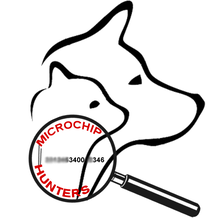
Here are two recent success stories:
A Good Samaritan found a Yorkie named Georgina, per her chip, but the contact information was incorrect. The microchip detectives got the form and soon traced the owner.
It was a rapturous reunion as you can see from the photos. Georgina had been missing for four months. The owner put up flyers when her dog got lost, but heard nothing. Sometime after that, she moved. Before moving, the owner went to her neighbors and gave them her phone number in case her dog was ever found.

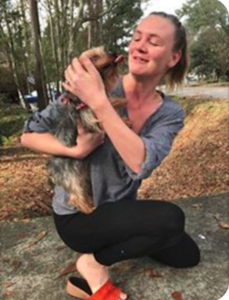
Georgina was with someone who cared for her, she was freshly groomed when found by the Good Samaritan. Whoever had her might have even had Georgina scanned, but tracing the owner was not simple. It would have taken hours of staff time. Not to bore you with the magic, but we could not find the owner through the registration either. However, the chip company gave us the name of the veterinarian who implanted the chip. That veterinarian had an additional contact number that led to a co-owner, who now no longer owned the dog, and that person gave us contact information for the owner.
Another case involves a shelter who contacts us at least once a week to trace a microchip. The dog in question was a purebred hunting dog. The dog’s handsome photo was posted on the shelter’s website and an “owner” soon showed up with kennel club papers to reclaim the dog. The owner’s name did not match the chip registration, but the claimant alleged the previous owner had sold the dog to him. Shelter staff asked us if we could try and trace the owner to verify this claim. In a very short time we found the real owner who said his Millie had been stolen and he was soon on his way to the shelter.
We asked the shelter director why she was suspicious of the person who had falsely claimed it was his dog. She said she had seen many hunting dogs come through the kennel and none was chipped. She just had a hunch this dog belonged on a couch.
Thanks to that hunch, Millie is home.
We are happy to help dogs like Georgina and Millie go home. It is also good community relations for the shelter or rescue. The media can’t seem to get enough of microchip reunions. So the next time you hear the dread message, “this number has been disconnected,” call for microchip help and get that dog home!
Thank you to Dr Magnifico, a small animal veterinarian. Here’s a great video about what happens when a pet is found with someone else’s microchip!
For pet health questions visit her site Pawbly.com.
Still need convincing? Check out this video about lost dog Buster!
Thank you to Buster’s family for letting us share this.
Learn about this topic from Lost Dogs of America
co-founder Kathy Pobloskie in the articles provided.
Not All Strays Are Homeless
NEW FREE RESOURCE available to help track a dead end microchip
What You Likely Don’t Know!
- The Microchip Maze – Buyer Beware! Part 1 – The 900 Chips
(note: here’s a corrected link for the 4th paragraph article reference) - The Microchip Maze – Part 2 – Searching the Databases
Lost Dogs of America “dead end microchip” resource!
The experience of Marilyn Knapp Litt, Director of Lost Dogs of Texas, provided the information in a fabulous article “How To Trace Dead End Microchips and Tag Information on Found Pets”. After Hurricane Katrina in 2005, Marilyn formed a group of volunteers which successfully reunited animals that had been displaced by the storm with their families.
August 15 is Check the Chip Day
Below is info provided on the AVMA website related to “Check the Chip Day”!
Microchips greatly increase the chances that pets will be reunited with their families if they are lost or stolen…but a microchip only works if its registration information is accurate.
This annual awareness day was created “to remind pet owners to have their pets microchipped and to keep the registration information up-to-date, AVMA and the American Animal Hospital Association (AAHA) joined together to create “Check the Chip Day.” With support from HomeAgain, we’ve been able to develop additional materials to promote the event.”


